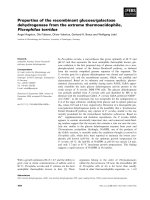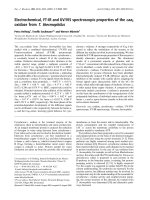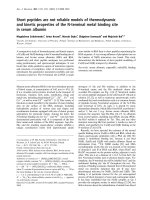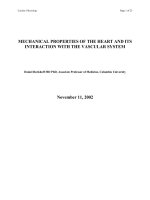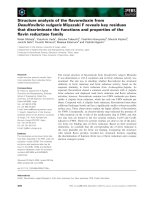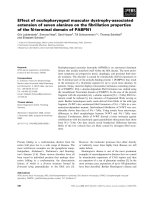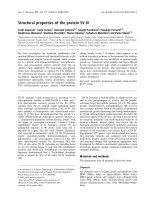Some properties of the generalized Van der Pol equation
Bạn đang xem bản rút gọn của tài liệu. Xem và tải ngay bản đầy đủ của tài liệu tại đây (2.71 MB, 9 trang )
Journal of Technical Physics, 17, 2, 183-190 1976.
Polish Academy o f Sciences, Jnstitutt o f Fundamental Technological Research, Warszawa.
SO M E PROPERTIES OF THE GENERALIZED VAN der POL EQUATION
NGUYEN VAN DAO (HANOI)
1. General investigation
Let us consider the following generalized Van der Pol equation [1]:
(1.1) X + 0J2X - f[\-(x + qcosvt)2]x = 0,
where CO, V, q are constants, and £ is a sm all parameter. W hen q — 0 we obtain the well-
known Van der Pol equation, for which there exists only one stable stationary oscillation
o f th e t y p e
(1.2) X = 2cos(cof -f a).
To investigate the vibrations described by Eq. (1.1) we first transform it into the
standard form by means of the formulae
(1.3) X = acoscp, x = — ứcosinẹ?.
The transformed equations are
~ = fứ[l - (ứ cos99 + <7cosw)2]sin29?,
(1.4)
— £ứ[l — ( ứ COS 99 + g COS V /) 2] sin 9? COS 9?,
where ip = 99 — CO/.
By employing the averaging method of non-linear oscillations [2] we obtain in the first
approximation the following equations for a and rp:
= ea/iO , v),
(15) ‘
Eqs. (1.5) have a zero solution a = a4tặ =3 0 and the other non-trivial stationary solutions
a = ^ 0 detei mined by the system
(1.6) /i(a „ v » ) => 0; f 2 ( a „ v»*) = 0.
The equation of variation for the zero solution is
dia
dt
184 Nguyen van Dao
Hence, the zero solution is stable if ( e > 0):
(1.7) / , ( 0 , w ) < 0 .
The equations of variation for the non-trivial stationary solutions have the form
dòa
w
(1.8)
d5y>
~dt
The characteristic equation of this system is
X2
Therefore, the conditions of stability for nontrivial solutions are
(1.9)
We shall consider now various resonant cases that correspond to the concrete values of
the frequencies CO and V.
2. The Resonant Case V = 3co
In this case the averaged equations (1.5) take the foim
da
(2.1)
da ea r - a2 , _ Ị
i = 4 l 2 _ 2 +ứ?C0S3v,| ’
dw a2
= -e ^ < ? s in 3 v ,
SO
r s - \ 1 02 a4 1
/ĩ(í’,y>) = Y ' 8 ~ 4 " t'4 y>’
(2.3)
Since
/ 2(a, vO = — sin3y
1 fl2
/i( 0 ,yO = ỳ - 4 9
then the zero solution a = 0 of the system (2.1) is stable if
q < Ý 2 , q > \ ' 2,
anj unstable if
- |/2 < q < ị/ĩ .
Some properties o f the generalized Van der Pol equation
185
The non-trivial stationary solutions a+) of the system (2.1) are determined from
the equations:
1. The first subcase
sin3^* = 0, cos = + 1 ,
aị-2 qa+ + 2q2 - 4 = 0,
hence
(2.3) = Inn, aẠ = q ± Ý 4 — q2.
As
m . - m
= 0
♦
then the conditions of stability (1.9) become
(24): (f).<0’
We have
(4Ệ),
from which it follows that when q > 0, the branch a,t = 0 - | / 4 - 02 is unstable and the
branch a+ = <7 + ^ 4 -# * is stable.
2. The second subcase
sin3y* = 0, cos3y>* = — 1 ,
+ -f 2q2 — 4 = 0,
hence
3v* = (2« + 1)tt, a* = - ạ ± v / 4 - ạ 2.
In this case the conditions of stability are also given by the formulae (2.4). We have
\ /* 4 4 + 4 ' * ’
/ g/a\ 3a,?
U w * 4 •
Consequently, when q < 0, the branch a+ = — q— Ị/ 4 — q2 is unstable and the branch
a+ — — <7+ y/4 - 02 is stable.
The dependence of the amplitude of vibrations upon the parameter q in the case V = 3eo
is presented in Fig. 1. The bold lines correspond to the stable regimes of vibrations. With
the increase of the parameter q the amplitude of vibrations changes along the lines
BCDEGHK. At the points c (q = — |'2 ) and G (q = 2) there is a jump in the amplitude.
An analogous phenomenon is also observed when decreasing the parameter q. Thus, in
the case V = 3co the amplitude of stationary vibration of the generalized system is bigger
than that of the initial system.
186
Nguyen van Dao
3. Vibrations in the case V = O J
Now, the averaged equations (1.5) are of the form
(3.1)
therefore
We have
da
£ /
~dt T \
a dip
dt 4 (
A (a,
v) =
1
T
v) =
?
4
/ , ( 0 ,
vO*:
l a 2 , q2 \
I - 2 + - y + q2 + aqcosy- — co s 2 ^ l,
/l(0 ,v ), = - ^ - | - 2 + g2 y C o s 2 V, j ,
where is an arbitrary number.
It will readily be seen that the zero solution a = 0 is stable if/ 1 (0 , y>*) < 0, or if q < —2
and q > 2.
Let us consider now the stability o f the non-trivial stationary solutions / 0.
The first stationary solution a*, yj* is determined by the equations
sinyj* = 0, aị + 2qa* + q2- 4 = 0,
from which we obtain
= — <7 ± 2 , y>* = 2wr,
where /1 is an integer.
Since 1-^ -1 = 1 1 = 0, then the conditions of stability of the stationary solu-
\ dy /* \ da u
tions also take the form (2.4). We have
= (fl*cosV* + 9cos2V*)“
Some properties o f the generalized Van der Pol equation
187
where the upper sign formula corresponds to the straight line a+ = - q + 2, while the lower
one to the straight line a+ = - q - 2 , from which it follows that for q > 0 the straight
line a+ = —q — 2 is unstable and the line a+ = —q + 2 is stable.
The second stationary value a+, Vi is determined as the solution of the equations
w here th e upper sign formula corresponds to th e straight line a+ = <7 + 2, while th e low er
on e to the straight line a+ = q — 2.
Following the inequalities (2.4) we conclude that the line Ơ* = q - 2 is unstable and
th e lin e = q + 2 is stab le where q < 0.
The third stationary solution y;* satisfies the equation
and therefore the first condition of stability (1.9) is not satisfied and the stationary solution
obtained is unstable.
The branches of the amplitude-curves that correspond to the stable stationary vibra
tions in the case V = a> are presented in Fig. 2.
siny* = 0, a\-2qa+ + q2 — 4 = 0,
he nc e
y* = (2n + 1)tt, a+ = q± 2 .
F o r th e ca s e u n d e r c o n s id e r a tio n w e h a v e
Substituting these values into the equation = 0 yields
In this case, we have
f i r ) “ 4 (a*+ÍC0SV'*) =
188
Nguyen van Dao
4. Stationary vibrations in the remaining cases (v =
For these cases the averaged equations become quite simple
1
d a
dt
ea
T
% . 0 . '
dt
It is easy to show that the zero solution a = 0 is stable if q2 ^ 2, and unstable if —1/2 <
< q < \ 2.
The nontrivial stationary solution
is stable for the values (ỹ2 < 2. Thus, for q2 < 2 the considered system vibrates with the
stationary amplitude a
aị — 4 - 2 q2.
For q2 > 2 the damping of vibrations takes place [1] (Fig. 3).
5. Experimental Results
The influence of the parameters q and V upon the amplitudes of stationary vibrations
has been investigated on the analog computer Meda 41TC. The operating amplifiers work
in that regime where the tensions at the output and the input have to be changed within
Some properties o f the generalized Van der Pol equation
189
the range of -1 0 to +10 volt. Consequently, for the normal work of the computer it is
necessary to transform the Eq. (1.1) into the «machinery» equations.
To that end we introduce the notations
z = y 2, y = X + qcosvt,
x i-, i - ± , y-JL, z . J L , q.JL,
■** y* *7#
-*■*> /*» z*> <7* > are the values of X, z, q that correspond to 10 volt.
Eq. (1.1) can now be rewritten in the form
-X = (’Sk^X -eX+ ek^XZ ,
where
k = i*-
K11 — .
**
/c 12 —
= r 2,
Y = k21X+ k 22Qcosvt, k2l = , * 2 2 = — .
Thus, the «machinery» equations take the form
-ÂT = w2Ar, 2 ATZ,
z = y 2,
K = k2] X-\-k22Q^osvt.
The following values of the parameters were assumed X* = xtl = 4, q+ = 2 and so
2 1
.y* = 6, z* = 36, kn = 1, k12 = 36, /c2i = 3 * *22 = -y • The analog circuit used in
this study is shown in Fig. 4. The results of experiments are presented in Figs. 1, 2, 3 by
round points.
F ig . 4.
190
Nguyen van Dao
References
Ì. J. H ale, Oscillations in nonlinear systems, New York—London 1963.
2. N. N. Bogoliu bov, Yu. a . M itropolsky, The asymptotic methods in the theory of nonlinear oscillations,
Moskva 1963.
Streszczenie
PEW NE W LA SNOSC I U OG Ó LNIO N EGO R 0W N A N IA
VA N der POLA
Nieliniowe uogólnione ukfady zawsze posiadajạ bardzicj rốznorodne wlaắciwosci w poróvvnaniu
z wyjsciowymi ukJadami. Stwoizcnic nowych, bliskich do znanych, nieliniowych ukỉadóvv i zbadanie ich
wlasnosci ma wazne znaczenic. w danym artykule zbadano drgania nieliniowych ukỉadỏvv, opisywanych
uogolnionym rốwnanicm Van dtT Pola w postaci podancj przez J. Halego [1J. Rozpatrzono stacjonarne
drgama w r6znych warunkach rezonansu i ich statecznosc.
Okazujc siẹ, ze drogạ odpowicdnicgo wyboru parametrow badanego ukladu mozemy kierowac amplitu
de stacjonarnych drgan od zcra do pcwncj okreslonej wartosci. Teorctyczne wnioski sạ sprawdzane przez
seriẹ doswiadczeri na maszynie analogowej ME DA 41TC. Tcorctyczne i doốwiadczalne wyniki sạ w pdnej
zgodnosci.
p e 3 10 M e
HEKOTOPLIE CBO0CTBA OBOBIUEHHOrO yPABHEHHfl BAH flep nOJIfl
He/iHHCHHbie oốoGiueHHbie cHCTCMbi Bcerfla oõiiaữaỉOT ố0Jiee MHoroo6pa3HbiMH cBoftcTBa.MH no
CpaBHeHHIO c HCXOAHbLMH CHCTe.Via.V.H. Co3AaHHe HOBLIX, OJIH3KHX K H3BeCTHl>IM, HeJIHHeỉÍHbIX CHCTeM
H HccJieAOBamie HX CBOHCTB HMeioT Ba>KHoe 3iiaMeHHe. B AaHHoổ craTbc HCCJie/iyeTCH KOJie6aHHe HejiH-
HeiÍHbix CHCTeM, orm cbiD aeM bix oõoõm eHH biM ypaBHeHHeM BaH flep r io jiH B ộop M C Jl>H. X eftjia [1 ].
PaccM aTpnnaioTc* crauHOHapHbie K0.ie6aHHH B pa3JUĩMHbix ycjiOBHHX pe30HaHca H HX ycroỉhtHBOCTb.
Oi<a3biD3CTCH 3 MTO nyTeM n o a x o A H m er o B b iố o p a n a p a M d p o B HCCJieAyeM oft CHCTCMbi M bi MO>KeM
ynpaBJiHTfe a.MnjiHTyAa.MH cTauHonapHbix KOJie6aiiHft OT HyjiH AO HenoToporo onpeaejieHHoro 3HaMeHHH.
TeopeTH HecKH e BbiBOAbi npoBepffioTC H cepna.MH 3 KcnepHMCHTOB Ha an aJ ioro B o ii MauiHHC M E JX A -4 1 T C .
TeopeTHMecKHe H 3KcnepnMeHTa/ii>Hbie pe3y;ibTaTbi HaxoAHTCH B nojiHQM corjiacH H.
Received July 25, 1975.
C z . R y m a h z a n d w . N i e p o r ẹ t , M ic r o -S tr u ctu r a l e l e ctr o h y d r o d y n a m ic m o d e l o f a c o n tin u o u s m e d iu m
M ik ro s tr u k tu ra ln y m o d el e le k tro h y d ro d y n a m ic z n y oắ r o d k a ciạg ỉe g o
MuKpocTpyKTypHafl STieKTporHApOAHHaMHMecKaH MOflejib CIUIOIHHOỈÍ cpe/Ịbi
M . S z u s t a k o w s k i , S p in w ave e ch o in fe rr o m a g n e tic su b s ta n c e s
Echo fal spinowych w ferromagnetykach
3 x o criHHOBbix BOJIH B ộeppo.MarHeTHKax
A. K aw alec and B. W^CKI, A monolithic convolver on transverse surface waves in a CdS crystal
with a thin semiconducting wave produced by the photo-effect
M o no lity cz n y k o n w o lu to r n a p op rz ec zn ych fa la ch p o w ie rz chnio w y ch w k ry s zta le C dS z c ie n k ạ
w arstw ạ p ố lp r ze w o đ z ^ cạ w y tw orz o n ạ za p o m o c ạ fo to e fe k tu
MoHOJiHTHbiH KOHBOJITOTOP ỉia nonepeqH bix rioBepxnocTHbix BOJiHax B KpHCTajme C ds c TOH-
KHM nojiynpoBOAHLLtfiM cJioe.M o6pa3t)BaHHbiM npH noMoum ộoTooộộeKTa
J. F in a k an d M . Sz u s ta k o w s k i, Application o f chain m atrix o f a four-pole lo the analysis o f thin-
layer piezo-electric transducers
Z asto s o w an ie m ac ie rzy laricu eh ow ej cz w ór n ik a d o an a liz y cic n k o w ar stw o w y c h p rz etw o r n ik ó w
piez o ele ktry c zn y c h
npHMeneuHe ueno^eMHott MaTpimki qeTbipexnojiiocHHKa ỊỤIH auaJ!H3a TOHKocJioHCTbix nbe303;ieK-
Tpniieci<HX npec)6pa30BaTejieH
S. K a lis k i, On conditions o f a reflect iofiless passage o f a shock wave through a medium o f jump-like
nonhomogeneity
o warunkach bezodbiciowego przejscia fall uderzeniowej przez osrodek skokowo niejednorodny
0 6 ycnoBHHx 0e30Tpa>KaTejiLH0r0 nepexofla yAapHOH BO/IHLI qepe3 CKa^n<00Ổpa3H0 HeoztHopoA-
u y io c p e a y
T. S to m p o r a n d E. W lo d a r c z y k , The role o f inert masses in the process o f fragmentation o f cylin
drical shells blast loaded
R o la m a s in e rc y jn y c h w pro cesie fra g m en ta cji p o w lo k cylin d r y cz n y c h o b c iạ z an y c h w ybu c h ow o
PoJTb H H T ep H b ix M acc B r ip o u e c c e ộ p a m e H T a ự H H LjHJiH H flpH^ecKH X 0Õ0Jic>HeK H arpy> K eH H bix
ĩinpblBOM
S. Kalisk i, Rendering the explosion compression isentropic by a “soft" layer effect
U iz e n tro p o w ie n ie kom presji w y buch ow e j za p o m o c ạ “ m iẹ k k ic j” w a rs tw y ze w n ẹ trz nej
H 3eH T pon H 3auH a B 3pbiB H oro CH<aTHH n p n nOMOlUH „ M H rK oro ” BHCLUHcro CJ10 H
H . D e r e n t o w i c z a n d z . Z io l k o w s k i , A m e th o d f o r p r o d u c in g is e n tr o p ic c o m p re ss io n o f p l e x ig l a ss
M e to d a u iz e n tr o p o w ie n ia p ro c esu k o m pre sji p lek sig la su
MeTOA H33HTponH3aijHH npoựecca c>KaTHH nJieKCHTJiaca
z . D z y g a d l o , I. N o w o t a r s k i a n d A . O l e j n i k , R e sp o n s e o f a c y lin d ric a l s h e ll in s u p e r so n i c fl o w
to a shock load
N ie s ta c jo n arn e d r g a n ia povvỉoki c y lin d ry czn ej, w n ad d zw iẹ k o w y m opỉyvvie w ym u sz o ne o bc i^ ze n ie m
u d erz en io w ym
HecTaựHOHapHbie KojieốaHHH uHJiHHflpHHecKoii oõonoHKH, B CBepx3ByK0B0M noTone, BbiHy>K-
AeHHbie yAapnoỉi Harpy3K0ii
H. W alukiew icz, Reciprocal theorem fo r discrete systems with random excitations
T w ie rd z e n ie w z aje m n e d ĩa ukỉadóvv dy s k re tn y c h z lo s o w ym w ym u sz en ie m
TeopeMa o B3&HMHOCTH flJIfl AHCKpeTHbIX CHCTCM CO CJiy^aHliblMii B03AeftCTBHHMH
p. M is u k , a . P a p lin s k i and E. W lo d a r c z y k , Cylindrical stress waves in an elastic medium generated
by a moving axisymmetrical super-seismic pressure pulse
C y lin d ry cz n e fa le n a p r ẹ ie n ia w o ổro dk ư sp rẹ zy s ty m w y w o la ne n a d se jsm ic z nym r u c h o m y m osio w o-
sy m e try c zn y m im pu Jsem ciấn ienia
Iịn/uĩHApHMecKHe BoJDibi HanpíDKeHHH B ynpyroìi cpeAC, Bbi3BaHHbie CBepxceflcMHMecKHM noA-
BH>KHbIM OCeCHMMCTpH'WblM HMiryJIbCOM AaBJieHHfl
M . S a d o w sk i, E . S k la d n ik -S a d o w sk a , K. S u d li tz a nd J. K u r z y n a , Plasma investigations by means
o f corpuscular diagnostic techniques
Badania plazmy metodami diagnostyki korpuskularnej
HcCJieAOBaKHH nJia3Mbl MCTOAaMH KOpnyCKyJlHpHOH AHarHOCTHKH
The next number of Journal of Technical Physics will contain the following papers



